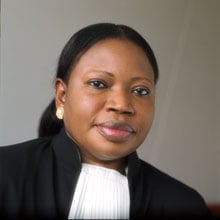By Nigel Ash.

Tripoli, 9 May 2013:
The trials of Saif Al-Islam, Abdullah Senussi and other top Qaddafi-era figures could become Libya’s “Nuremberg . . .[restrict]Moment” a top prosecutor has said, a moment which will serve to confirm the primacy of the rule of law, due process and human rights for future generations.
Fatou Bensouda, a senior prosecutor at the International Criminal Court reported to the UN Security Council on Wednesday that in Libya, despite important progress in terms of democracy, the rule of law and respect for human rights, “many challenges remain”.
She revealed that the ICC was shortly due to rule on the admissibility of challenges by Libya to the court’s wish to have Saif extradited to the Hague to stand trial there. She also said that last week, her prosecution office had filed with the court, its response to a similar challenge over the trial of Senussi.
While giving no indication of the content of that response, Bensouda made a point of praising the Libyan government’s conduct over the two casse: “It is commendable that Libya is invoking its rights under the Statute [of Rome] through a judicial process. In doing so, Libya demonstrates full understanding of the difference between the [Security] Council’s political mandate and the ICC’s judicial mandate, even where… [ the Security Council] … has referred the situation to the ICC.”
The ICC is clearly sensitive about its Libyan involvement, not least because of the month-long detention last year in Zintan of Melinda Taylor, Saif’s defence lawyer appointed by the ICC. Taylor, an Australian, was accused of smuggling documents to Saif. Supposed, as an officer of the court, to enjoy immunity from arrest or interference, she was only released along with three ICC colleagues after ICC President Sang-Hyun Song had apologised, albeit in ambiguous terms, for the incident. Once freed, Taylor went public with her belief that Saif would not receive a fair trial in Libya. She was also critical of the ICC’s response to her detention. She is no longer listed as one of the ICC’s counsels.
From what Bensouda told the Security Council, it is also clear that the ICC sees the prosecutions of Saif and Senussi as tests for its overall future effectiveness, not least because it has been criticised in some quarters, because so far all the prosecutions the court has launched have been of accused from Africa.
Bensouda noted in her report: “Libya is engaged in the development of the law: irrespective of outcome, the admissibility processes [ of the Saifand Senussi prosecutions] underway at the ICC will set the standard for years to come for how the court and states interact with each other regarding national proceedings.”
Bensouda said that the ICC was still investigating other Qaddafi-era officials. She disclosed that it was shortly due to make a decision on a further senior member of the old regime, whom she did not name.
She also revealed that the prosecutor’s office was looking at allegations of crimes committed by rebel forces. “These include the expulsion of residents of Tawergha, who have been unable to return home; ongoing alleged persecution of ethnic groups perceived to have been affiliated with the Qaddafi regime and specific incidents, as yet unaccounted for, like the alleged execution of fifty persons in the grounds of the Mahari Hotel in Sirte in October 2011.”
She added that her office was also looking at allegations of arbitrary detention, torture, killings and destruction of property during Libyan government and militia operations in Bani Walid in September 2012.
“ I have recently met the new Libyan Prosecutor-General, Mr. Abdel Qader Radwan,” she said, “and the Libyan ICC Focal Point, Dr Ahmed El Gehani, who travelled to the Hague at my request to discuss our ongoing investigations” she said, “The constructive and fruitful discussions between my office and the Libyan delegation focused on cooperation and coordination of efforts to advance the office’s investigative activities both within and outside of Libya.
She continued: “These preliminary positive discussions illustrate the willingness of my office and the government of Libya to cooperatively work together in furthering investigations that could lead to the arrest and surrender of alleged perpetrators, both inside and outside of Libya. I am planning to travel to Libya soon to further my discussions with the highest political authorities.”
Reflecting international concern about reported continuing human rights violations in Libya, New-York based Human Rights Watch launched a call to the UN to act against officials and militia leaders who are guilty of human rights crimes in Libya.
“The time has come for the Security Council to sanction officials and militia commanders who ordered or failed to prevent serious crimes,” it said in a statement yesterday, issued to coincide with the ICC prosecutor’s briefing.
“The new Libya,” the statement read, “is still plagued by serious abuses, some amounting to crimes against humanity. The authorities are failing to stop the persecution of the Tawergha community and have yet to end widespread arbitrary detention sometimes accompanied by deadly abuses.”
It warned that the briefing was a reminder that the ICC was still free to probe ongoing crimes in Libya.
[/restrict]






